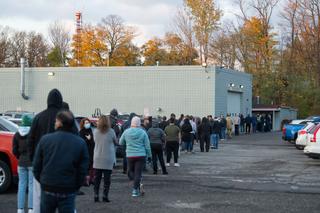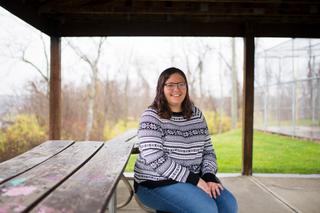This article is made possible through Votebeat, a nonpartisan reporting project covering local election integrity and voting access. This article is available for reprint under the terms of Votebeat’s republishing policy.
PITTSBURGH — About two weeks before Election Day, Becca Levine, 27, got a phone call from a county official telling her she would be a judge of elections on Nov. 3.
Levine was among the thousands who volunteered to work the polls for the first time this year, yet she ended up with the most crucial role — a “daunting” assignment. Judges of elections run polling places and are responsible for reporting the results to the county.
“I imagined that if they were making me in charge, then that probably meant that the other poll workers would also not have had any experience before either,” Levine said.
When she arrived at her assignment in the Pittsburgh neighborhood of Knoxville, she learned just two people would be working under her, neither of whom had any training or past experience. Two other people assigned to the polling place never showed up, she said.
One of the poll workers was not supposed to work the entire day, “but he ended up staying for most of the day, because it also would not have been possible without him,” Levine said.
A staffing shortage at this Allegheny County polling place was just one of the countless challenges workers across Pennsylvania faced as they pulled off a sound election with a record 71% turnout of the voting-age population.
Spotlight PA and Votebeat interviewed eight Allegheny County poll workers, who suggested the success of Election Day was far from inevitable. Volunteers brand new to the job described a hire-wire act of learning important election procedures on the fly, often with anxious voters and other poll workers who also had little to no training.
“It definitely did feel like I was expected to kind of train everyone at the polling site even though I also didn’t really know what I was doing either,” Alyssa Lisle, 24, a first-time judge of elections, said. “It was definitely a lot of pressure.”
Much of the chaos that new poll workers described came from unclear communications with hard-to-reach county workers in the weeks and days leading up to Election Day. Some, like Lisle and Levine, received important assignments only a week or two before Nov. 3, and essential training materials only days before the election.
But some of the Election Day issues can be traced to long-standing deficiencies at the state level.
Pennsylvania election law is mostly silent on poll worker training, requiring only that the commonwealth secretary develop a training program in consultation with county officials, and that counties pay poll workers for participating in that training.
Generally, the length and quality of training offered is largely left up to counties, and it varies widely across Pennsylvania, said Pat Christmas, policy director of the good-government group Committee of Seventy in Philadelphia.
Allegheny County’s two-hour, in-person training is substantial compared to elsewhere, Christmas said. (In the past, training sessions in Philadelphia were as short as 15 minutes.) Still, new poll workers there said they didn’t feel prepared to carry out some important tasks at the polls.
Officials in Delaware and Erie Counties have already cited inadequate training among poll workers as a source of issues in an otherwise sound general election.
At a recent public meeting, Delaware County officials said that they had to help judges of elections fix incorrectly filled-out paperwork used to cross-reference the number of people that voted at their polling place.
A post-election report from Erie County’s clerk said there were “significant instances where judges of elections lacked understanding about the basic operation of the polling place.” The report also concluded that poll workers needed more training on how and when to utilize provisional ballots.
Pennsylvania’s election code also doesn’t make it easy for counties to efficiently recruit and train poll workers, according to Christmas.
Under state law, each voting precinct elects its own three-member elections board: the judge of elections, and the majority and minority inspectors, one from each major political party. Inspectors work under the judge of elections, along with clerks, who are supposed to be appointed by inspectors.
But few Pennsylvanians run for these roles anymore, Christmas said, and more and more of those offices go vacant. There are only two other ways for people to fill them: either an individual can collect signatures to petition a Common Pleas judge for an appointment, or the vacancies must be filled by a county Board of Elections.
In Allegheny County, those remaining appointments ran in the thousands in 2020, and state law stipulates officials can only make those selections within five days of the election.
“What counties have had to do out of sheer practicality, for years and years, is have an assessment of where they know the vacancies are and kind of have people ready to go,” Christmas said. “But those people don’t get formally appointed to fill them until five days out.”
Ron Bandes, who has been a Pittsburgh judge of elections for a decade, said the law assumes most poll workers will be recruited to run or appointed by party officials. Most local party committees don’t do this anymore, he said. A county board of election’s power to appoint temporary poll workers at the last minute is not supposed to be the primary method.
“This is a responsibility they’re not even supposed to bear,” Bandes said.

Too much of a good thing
This year was already going to be a complicated one for election officials, who were tasked late last year with implementing no-excuse mail voting for the first time.
After the pandemic hit, election officials confronted a poll worker crunch for the June primary. That’s when longtime volunteers, many of them older, opted out amid the risks associated with the coronavirus. Many counties were forced to reduce the number of polling locations.
Voting rights groups sprang into action, launching wide-reaching campaigns on social media encouraging younger voters to sign up and work the polls on Election Day. The effort worked.
Allegheny County spokesperson Amie Downs said more than 12,000 people volunteered to fill about 6,600 slots. In Philadelphia, more than 20,000 people volunteered for 8,500 positions.
Statewide, more than 40,000 poll workers work each election at some 9,000 polling locations.
But the flood of new volunteers also brought complications. Two weeks before Election Day, Allegheny County’s elections division was overrun with more than 7,000 calls a day, Elections Division Manager David Voye said during an October Board of Elections meeting.
The call volume was so relentless, the staff operating the phones couldn’t make the outbound calls they needed to schedule volunteers for the polls, he said. Two weeks before Election Day, county officials still needed to assign volunteers to 1,200 poll positions, Voye said.
Under enormous pressure to pull off an extremely complex general election, many in the elections division were working 12-hour days during the week and 10-hour days on the weekend, Voye said.
Poll workers who spoke to Spotlight PA and Votebeat said the county workers they interacted with, though they were gracious and hard-working, struggled to give clear and timely directions about poll workers’ responsibilities and important logistics, like where they’d be assigned.
Michael Calderon, 30, became a poll worker for the first time on Nov. 3, but only because he showed up to his local polling place in Pittsburgh to see if it needed help.
“No one could just look it up and say, ‘This is where you can go,’ or ‘We’re full everywhere,’” Calderon said. “It was always, ‘We’ll call you back, we’ll call you back.’”
The Allegheny County poll workers who spoke to Spotlight PA and Votebeat described uneven staffing at polling places — some were short workers, others seemed to have as many as six, more than needed, they said.
Elaine Magil, 40, an affordable housing consultant, signed up online to be a poll worker close to the end of August, she said, and didn’t hear anything from the county for a few weeks. In September, she saw a message in the online neighborhood forum Nextdoor from a county worker looking to recruit new poll workers from her Pittsburgh neighborhood, she said.
Magil then followed up with an email to the county worker, who assigned her as a clerk to a nearby polling place. But just days before the election, Magil said she logged onto the county’s website again and still wasn’t assigned.
“So I showed up to the place the woman told me,” Magil said. “They didn’t seem to be like, ‘Oh you must be so-and-so,’ but they also didn’t seem confused that I was there.”
Counties including Allegheny would be able to remove some of the unpredictability faced by volunteers if they were given more time to appoint temporary workers, Christmas said. Local officials unsuccessfully asked state lawmakers over the summer to give them 60 days in advance of an election.
“It also puts the county in a better position to make sure that person goes through training and is properly prepared,” Christmas said.

Training day
Suzanne Almeida, counsel at Common Cause Pennsylvania, said Election Day complaints that involved confusion or lack of knowledge from poll workers occurred around the state, though the bulk of them came from Allegheny County.
Voting rights organizers in Allegheny County said they received reports of a number of poll worker mistakes, much of them related to mail ballots. Poll workers in multiple polling locations didn’t know how to spoil a mail ballot so voters who applied to vote by mail could vote in-person, they said, and in some of those cases they incorrectly issued voters provisional ballots.
“Our Election Protection folks were probably more trained than people who were inside the polling place,” said Calyx Deroche, media and data consultant at the Pittsburgh-based Black Political Empowerment Project, referencing the nonpartisan Election Protection coalition. “I think our county probably was overwhelmed with all the processes and procedures, with satellite offices and mail-in ballots, and hadn’t had a weekend off in two months.”
A spokesperson for Allegheny County, Amie Downs, did not directly address any of the issues described by poll workers and observers on Election Day, but said any review or postmortem has yet to occur.
“It’s safe to say that with so many new poll workers and a new voting system, along with the heightened scrutiny and record-breaking turnout, that we have a lot to look at and much that we can improve upon before the municipal primary in 2021,” Downs said.
This year, Allegheny County offered training to judges of elections and majority and minority inspectors, while clerks only had to show up on Election Day and take direction from the judge of elections.
Levine, like others, said the trainers were knowledgeable, but they spent most of the time on the county’s new paper ballot-scanning machines, and she didn’t retain much about issues that arose on Election Day, like how to spoil mail ballots and when to issue provisional ballots.
“It wasn’t super educational, I would say,” Levine said.
Lisle, a graduate student, signed up for the training before she received an assignment at a polling place in Bethel Park. It was her first time volunteering as a poll worker.
She attended training in October. Her instructor, Lisle said, told the class there were some items only judges of elections needed to know, and any judge of elections would have received a letter in the mail notifying them that they were one.
“So I didn’t pay attention to it, and then you know a month later,” the county assigned her to be a judge of elections, she said.
What poll workers, particularly new judges of elections, said saved them in many instances was a handbook county officials provided the weekend before Election Day. The county’s training stressed, as it has in the past, that no one was expected to absorb everything in two hours, and they could always use the handbook.
“It just sort of listed out everything that you kind of need to know, I thought the handbook was really well done,” she said.
Another savior, new poll workers said, was the county officials who made rounds at polling places, called “rovers.” The county workers helped explain issues like how to issue provisional ballots and paperwork needed to close the polls, they said.
But what poll workers may have lacked in training, Deroche said, they made up for with determination.
“People were just more intentful, they cared more, they were more passionate about making sure the voting process was just, legal, and constitutional, and that everybody who was eligible had the right to vote,” she said.
Jamie Martines of Spotlight PA contributed reporting.
100% ESSENTIAL: Spotlight PA relies on funding from foundations and readers like you who are committed to accountability journalism that gets results. Give now and your contribution will be DOUBLED: spotlightpa.org/donate
